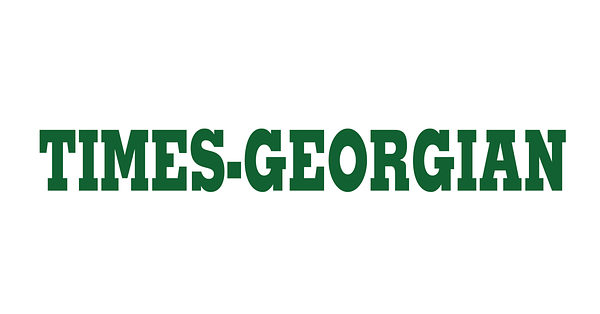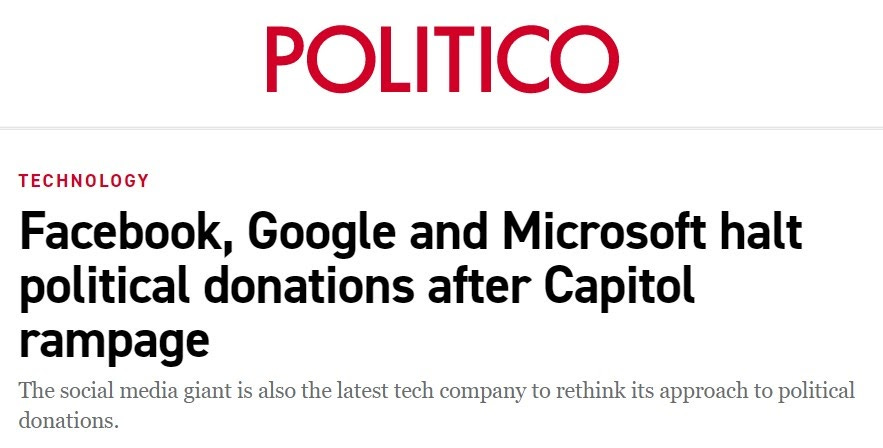Facebook pledged to suspend political donations, then quietly funneled $50,000 to GOP group pushing voter suppression laws
On January 11, Facebook announced that "following last week's awful violence" it was suspending donations from its political committee "for at least the current quarter, while we review our policies."
But campaign finance records obtained by Popular Information reveal that, 44 days later, Facebook donated $50,000 to the Republican State Leadership Committee (RSLC). Facebook routed the donation through a fundraising vehicle that the RSLC set up in Virginia, a state with lax campaign finance laws that allows unlimited direct corporate contributions.
The primary goal of the RSLC is to elect Republicans to state legislatures and other state-level offices across the country. In 2021, Republican state legislators introduced 361 bills to restrict voting in 47 states, according to the latest report by the Brennan Center. (By February 19, just prior to Facebook's donation, the Brennan Center had identified 253 such bills.)
In addition to supporting the election of legislators that are pushing measures to restrict voting, the RSLC is directly encouraging state officials to make voting more difficult. The group supported a version of the Georgia voting legislation that was even harsher than the measure that ultimately became law. The RSLC supported ending no-excuse absentee voting in Georgia and completely banning drop boxes.


On February 17, the RSLC launched its "Commission on Voting Integrity." Although the RSLC claims its purpose is to make it "easier to vote and harder to cheat," the explicit goal of the Commission is to roll back changes to voting procedures put in place during the pandemic to make voting easier. "Democrats in 2020 used the pandemic to alter election laws in their favor — now they want to make those changes permanent," the Commission website says. The RSLC warns that unless new restrictions are put in place to make it "harder to cheat" then "Democrats will dominate elections for years to come."
The Commission endorses purging voter lists, new ID requirements, ensuring every voter is "thoroughly monitored by outside observers."
Any doubt about the purpose of the Commission was resolved when the RSLC named Alabama Secretary of State John Merrill (R) as co-chair. Merrill spoke at a "Stop the Steal" rally for Trump supporters. He also publicly supported efforts by Republicans in Congress to reject the results of the Electoral College vote and overturn the election. Merrill also propagated specific falsehoods, including the claim that there were a large number of fraudulent ballots cast in Michigan.
Another member of the Commission is Michigan Senate Majority Leader Mike Shirkey (R). Shirkey, who also sits to the RSLC executive committee, claimed that "too many dead people" voted in Michigan, long after the claim was debunked by state officials. Shirkey also claimed that the January 6 riot was a "hoax" that didn't involve "Trump people." Shirkey apologized but then was caught on a hot mic saying he didn't actually "take back" anything.
There are many other members of the Commission on Voting Integrity and the larger RSLC organization that hold similar views. Facebook's large contribution to the RSLC appears in conflict not only with its January 11 statement pledging to suspend all political contributions but its more recent statement in support of voting rights.
"We support making voting as accessible and broad-based as possible and oppose efforts to make it harder for people to vote," Roy Austin, VP and deputy general counsel for civil rights, said in a statement last week. But Facebook's $50,000 contribution to the RSLC will support an organization working to make it harder to vote.
In response to a request for comment, Facebook told Popular Information that the $50,000 donation to the RSLC was "standard practice" and represented "membership dues" to the Republican Lieutenant Governors Association (RLGA).1 The donation, Facebook said, "reflects the fact there’s an election happening in Virginia, with a lieutenant gubernatorial race on the ballot, this year." The RLGA, however, is not an actual organization but a caucus that is operated by the RSLC.
There is nothing that prevents the RSLC from using Facebook's funds for any purpose. Even if the RSLC represented that Facebook's donation would only support the RLGA, it would have no practical effect. Facebook says that its money was not "used in the passage of voting legislation in Georgia." But it sent money to an organization that worked in Georgia to pass an even more extreme version of the bill that became law.
Republican Lieutenant Governors have also been active in supporting laws to restrict voting around the country. In Texas, for example, Lieutenant Governor Dan Patrick formally named "election integrity" as a priority for the 2021 legislative session. When American Airlines issued a statement opposing SB 7, which would restrict voting by banning drop boxes, prohibiting drive-thru voting locations, and other measures, Patrick released a rambling response blasting the company. "Texans are fed up with corporations that don’t share our values trying to dictate public policy," Patrick said, "By the way, this is the same American Airlines that in 2017 led the fight to try to force us to allow boys to play girls sports in Texas and take away their scholarships."
Virginia Delegate Glenn Davis, the frontrunner to be the Republican nominee for Lieutenant Governor, opposed legislation to make voting in the state easier — including allowing no-excuse early voting and establishing drop boxes for collecting ballots — saying it would lead to "voter fraud."
Facebook also suggested its pledge suspending political donations for 90 days only applied to the Facebook PAC and not to direct corporate contributions, which is how it sent $50,000 to the RSLC. But Facebook did not explain why, if it believed as an organization that political contributions should be suspended for 90 days, political contributions from its corporate funds were any different than political contributions from its PAC.
Facebook, however, isn't the only company publicly championing voting rights while discreetly funding the RSLC.
Google voter suppression
"We're concerned about efforts to restrict voting at a local level and we strongly support the John Lewis Voting Rights Advancement Act," Google Senior Vice President Kent Walker tweeted on March 31.
Walker did not mention that on February 11, 2021, Google donated $20,000 to the RSLC.
Google has pledged to suspend donations to the 147 Republicans who objected to the certification of the Electoral College. These members of Congress attempted to overturn the results of the elections based on Trump's lies about voter fraud. Google has not violated this pledge but is now supporting an organization seeking to codify changes to state election laws based on the same lies.
Google did not respond to a request for comment.
AT&T's money speaks clearly
AT&T is one of the top contributors to Texas politicians pushing measures to restrict voting through the legislature. The company donated $574,500 to that group over the last three years.
But AT&T has struggled to take a clear stand on the Texas legislation. AT&T CEO John Stankey said in a statement that the company "believes the right to vote is sacred" but "election laws are complicated" and "not our company's expertise."
AT&T's political contributions paint a somewhat clearer picture. Although the company has suspended donations to the 147 Republicans who objected to the certification of the Electoral College, it donated $50,000 to the RSLC on March 9.
AT&T did not respond to a request for comment.
Major corporate donors to the RSLC in 2021
Other prominent corporations that have donated significant sums to the RSLC in 2021:
This is the full Facebook statement sent to Popular Information: “It is standard practice for us to support organizations like this on both sides of the aisle and the filing reflects the fact there’s an election happening in Virginia, with a lieutenant gubernatorial race on the ballot, this year. While earlier this year we paused spending from FBPAC, we use corporate funds to pay membership dues like these to the Republican Lieutenant Governors’ Association as we do in our support for the Democratic Lieutenant Governors’ Association. None of these funds were used in the passage of voting legislation in Georgia.”






Thank you for doing the work to follow the money. Keep the pressure on! It is the only way to consistently show the hypocrisy.
Facebook double standard rises again. I am calling Bull Sh*t on the statement none of this money was used for the purpose of voter supression. We all know they haven't asked to look at a financial statement on where it goes. And if they did you can durn well bet, it is discretionary. Even if goes to salaries, it is furthering the cause of that group and their attempts at voter supression.
FB executives were with the GOP if I recall your earlier newsletters prior to FB employment and the head weasel Zuckerberg goes to Federalist Society dinners.
Typical Republican double speak with alternate facts as their truth.
Thank you for this article.
PS.
AstraZeneca Covid Vaccine appears faulty. Perhaps they should keep their money for research instead of politics.